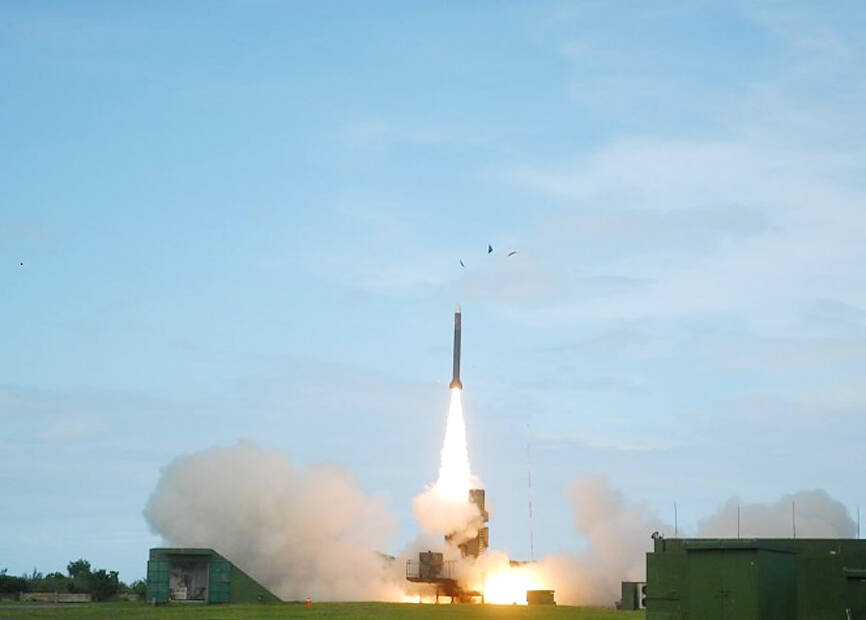The Chungshan Institute of Science and Technology has completed work on a project codenamed “Strong Bow” (強弓), an extended-range version of the Tien Kung III (天弓三, “Sky Bow” III) surface-to-air defense missile, the Ministry of National Defense (MND) said in a report to the legislature.
Testing of the missile’s combat readiness was completed in February, and preparations have begun for mass production and incorporation of the missile into the armed forces’ restructuring plan, the ministry said.
The report to the legislature’s Foreign Affairs and National Defense Committee was written following a request from legislators across party lines for an update on the institute’s progress on developing defensive responses to missile attacks.

Photo courtesy of the Chungshan Institute of Science and Technology
During testing, the missile intercepted objects at altitudes of up to 70km, a source said on condition of anonymity.
A second variant of the Strong Bow, currently in testing, has an estimated intercept altitude of 100km, the person said.
The maximum intercept height of Sky Bow III and Patriot III missiles — both of which are in service in Taiwan — is 40km.
“Although the Strong Bow is referred to as an extended-range Sky Bow III missile, the two are different systems,” the person said.
“The Strong Bow is equipped with a domestically produced, high-efficiency microwave power amplifier, which can intercept intercontinental ballistic missiles and other objects at much greater altitudes than the US-made Patriot missile,” the person said.
The Strong Bow also uses a new type of cone cover, along with a composite material for the fuselage and a more efficient propulsion system, all of which are an improvement on the Sky Bow III’s performance, the source said.
The Chungshan Institute had been testing the Strong Bow at a missile base in Pingtung County’s Jiupengwan Bay (九鵬灣), where it also might be testing a longer-range version of the Hsiung Feng II-E (雄風, “Brave Wind”) missile, under the project name Hsiung Sheng (雄昇), the person said.
Part of those tests included simulated intercepts of a ballistic missile, which was first successfully tested at the site on Aug. 18 last year, the source said.
The ministry said it is bolstering its overall missile defense network to provide it with an improved defensive advantage against enemy threats.

‘FORM OF PROTEST’: The German Institute Taipei said it was ‘shocked’ to see Nazi symbolism used in connection with political aims as it condemned the incident Sung Chien-liang (宋建樑), who led efforts to recall Democratic Progressive Party (DPP) Legislator Lee Kun-cheng (李坤城), was released on bail of NT$80,000 yesterday amid an outcry over a Nazi armband he wore to questioning the night before. Sung arrived at the New Taipei City District Prosecutors’ Office for questioning in a recall petition forgery case on Tuesday night wearing a red armband bearing a swastika, carrying a copy of Adolf Hitler’s Mein Kampf and giving a Nazi salute. Sung left the building at 1:15am without the armband and apparently covering the book with a coat. This is a serious international scandal and Chinese

PERSONAL DATA: The implicated KMT members allegedly compiled their petitions by copying names from party lists without the consent of the people concerned Judicial authorities searched six locations yesterday and questioned six people, including one elderly Chinese Nationalist Party (KMT) member and five KMT Youth League associates, about alleged signature forgery and fraud relating to their recall efforts against two Democratic Progressive Party (DPP) legislators. After launching a probe into alleged signature forgery and related fraud in the KMT’s recall effort, prosecutors received a number of complaints, including about one petition that had 1,748 signatures of voters whose family members said they had already passed away, and also voters who said they did not approve the use of their name, Taipei Deputy Chief Prosecutor

UNDER ATTACK: Raymond Greene said there were 412 billion malicious threats in the Asia-Pacific region in the first half of 2023, with 55 percent targeting Taiwan Taiwan not only faces military intimidation from China, but is also on the front line of global cybersecurity threats, and it is taking action to counter those attacks, President William Lai (賴清德) said yesterday. Speaking at the opening of this year’s Cybersec Expo in Taipei, the president assured foreign diplomats and exhibitors that Taiwan remained committed to strengthening its defense against cyberattacks and enhancing the resilience of its digital infrastructure. Lai referenced a report from the National Security Bureau (NSB) indicating that the Government Service Network faced an average of 2.4 million intrusion attempts daily last year, more than double the figure

COUNTERINTELLIGENCE TRAINING: The ministry said 87.5 percent of the apprehended Chinese agents were reported by service members they tried to lure into becoming spies Taiwanese organized crime, illegal money lenders, temples and civic groups are complicit in Beijing’s infiltration of the armed forces, the Ministry of National Defense (MND) said in a report yesterday. Retired service members who had been turned to Beijing’s cause mainly relied on those channels to infiltrate the Taiwanese military, according to the report to be submitted to lawmakers ahead of tomorrow’s hearing on Chinese espionage in the military. Chinese intelligence typically used blackmail, Internet-based communications, bribery or debts to loan sharks to leverage active service personnel to do its bidding, it said. China’s main goals are to collect intelligence, and develop a